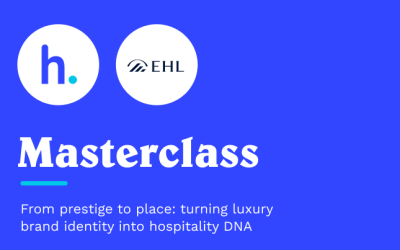What defines luxury today? In a world where guests are more connected, discerning, and values-driven than ever before, the meaning of high-end service is changing. For brands rooted in heritage, the challenge isn’t just to preserve what made them iconic—it’s to evolve with purpose, creativity, and cultural relevance.
This question took center stage in the latest masterclass co-hosted by Hosco and EHL Hospitality Business School, featuring two of the industry’s most respected voices:
- Dr. Marc Stierand, Full Professor of Service Management at EHL and Director of the Institute of Business Creativity
- Philipp Mosimann, Executive Director of Mosimann’s Private Dining Club & Global Events
Moderated by Hosco’s Raksha Daryanani, the session combined academic insight with real-world experience to deliver an inspiring look at what it means to lead, innovate, and craft timeless experiences in luxury hospitality today.
Creativity Isn’t Just Artistic—It’s Operational
Creativity in hospitality is often misunderstood. It’s not just about showstopping dishes or extravagant décor—it’s about how teams solve problems, anticipate guest needs, and respond to changing dynamics.
“Creativity is a mindset,” Dr. Marc Stierand explained. “It’s not about being the loudest or most original voice. It’s about stepping into ambiguity and asking, ‘What if?’”
In luxury hospitality, creativity surfaces in everything from menu design to how a team adapts under pressure. According to Dr. Stierand, some of the most impactful innovations happen in everyday moments—shift briefings, post-event reflections, or informal conversations between colleagues.
This aligns with a 2023 McKinsey report, which names creativity, curiosity, and adaptability as top leadership traits for navigating complexity and fostering resilient cultures.
Heritage Isn’t Static—It Evolves With Guests
Few understand the nuance of heritage better than Philipp Mosimann. As Executive Director of Mosimann’s, a Royal Warrant holder and global icon of private dining, he knows the power—and responsibility—of legacy.
“Heritage is not about looking backward,” he said. “It’s about knowing your roots so you can evolve with authenticity.”
At Mosimann’s, which has served royalty, presidents, and Olympians, honoring tradition is key—but so is growth. That means reimagining the menu for modern dietary needs, adjusting tone for younger guests, and integrating sustainability without compromising excellence.
“It’s not enough to be excellent anymore,” Mosimann added. “You must be relatable.”
The trend is clear. According to the World Travel & Tourism Council (WTTC), younger luxury travelers prioritize cultural authenticity and sustainability as much as exclusivity.
To explore more on career paths within the evolving luxury space, see: Luxury Experiences Are Hot: Here’s How To Work in This Field
Leading Through Culture, Not Just Processes
Creating a luxury experience is impossible without cultivating the right internal culture. Both speakers emphasized that the foundation of hospitality excellence is people—teams who feel aligned, trusted, and inspired.
“Creative leaders are not heroes,” said Dr. Stierand. “They’re facilitators. They ask good questions, they listen, and they build trust through humility.”
Mosimann echoed the sentiment: “In our business, there’s no luxury without people. Our chefs, our servers, our coordinators—they all carry the brand experience.”
At Mosimann’s, onboarding is immersive. New hires are not only trained in service techniques, but also in the emotional DNA of the brand—how to create presence, anticipation, and discretion.
“When someone joins us, they don’t just learn how to serve a dish,” he said. “They learn how to make someone feel like they belong in that moment.”
From Mechanics to Meaning: How Teams Are Trained
Training in luxury hospitality isn’t just about perfecting mechanics—it’s about teaching people how to make guests feel seen.
Dr. Stierand emphasized that while creativity can’t be taught like a checklist, it can be nurtured: “We can create environments where people feel safe enough to share ideas, try something new, and reflect without fear of failure.”
Mosimann shared how his team celebrates initiative—those subtle, instinctive gestures that elevate service into artistry. “If someone sees a guest’s glass empty and finds a beautiful, quiet way to refill it—that’s luxury,” he said.
Want more on growing into a leadership mindset? Read: From Manager to Leader: Building Skills and Gaining Support for Career Advancement in Hospitality
Gallup’s State of the Global Workplace Report 2023 supports this approach, showing that employees who feel heard and trusted are more productive and significantly more engaged at work.
Creativity Needs Time—Not Just Pressure
In high-performance environments, there’s often little room for pause. But according to Dr. Stierand, reflection isn’t a luxury—it’s a necessity.
“We expect people to be creative under time constraints,” he said. “But without time to think, all you get is pressure—not innovation.”
He encouraged leaders to create small moments for reflection—team huddles, quiet time, and space for cross-pollination between departments.
For more on building this kind of mindset, see: Building Resilient Leadership in the Hospitality Industry
Personalization Is the New Luxury Standard
Mosimann emphasized that personalization has replaced perfection as the gold standard in luxury hospitality.
“We don’t ask, ‘How can we impress?’” he said. “We ask, ‘How can we understand?’”
Whether through detailed dietary notes, subtle tone shifts, or room setup preferences, personalization is now the entry point—not the differentiator.
“Luxury is not about extravagance,” Mosimann added. “It’s about empathy executed with precision.”
Evolving With Purpose
The modern luxury guest is emotionally intelligent, culturally aware, and deeply connected to their values. Brands that wish to stay relevant must do more than keep up with trends—they must evolve with purpose.
This masterclass reminded us that creativity in luxury isn’t about reinventing the wheel—it’s about understanding the moment, the guest, and the team delivering the experience.
As Dr. Stierand noted, “Excellence is not a point. It’s a path.”
Looking to climb that path? See: How to reach the GM seat at the world’s most refined luxury hotels with Tim Weiland
Learn Leadership with EHL
EHL Hospitality Business School offers tailored programs to help hospitality professionals develop creative, human-centered leadership in the food and beverage sector. From executive education to master’s degrees with a specialization in F&B, EHL equips talent to lead with clarity, care, and excellence in one of hospitality’s most dynamic fields.
Discover how EHL can support your evolution:




